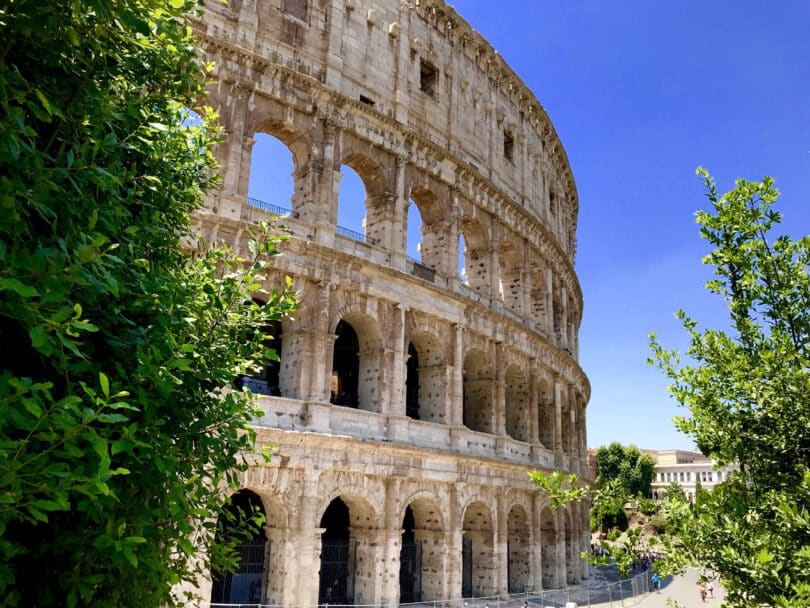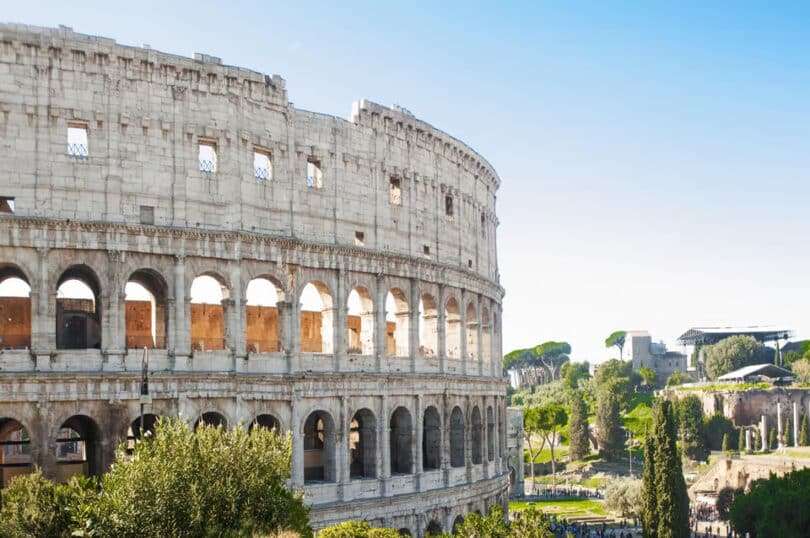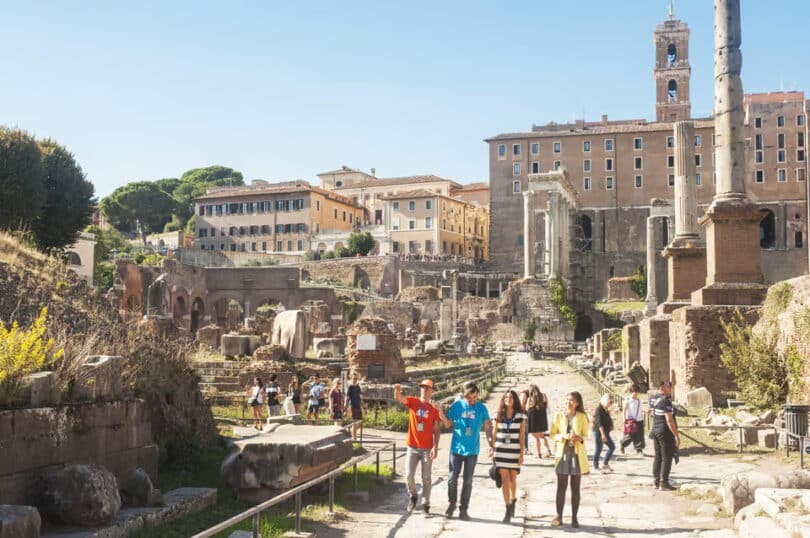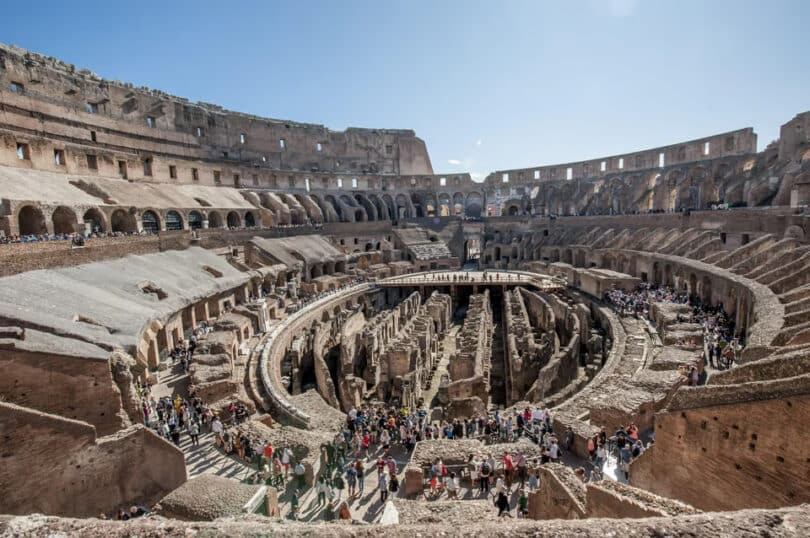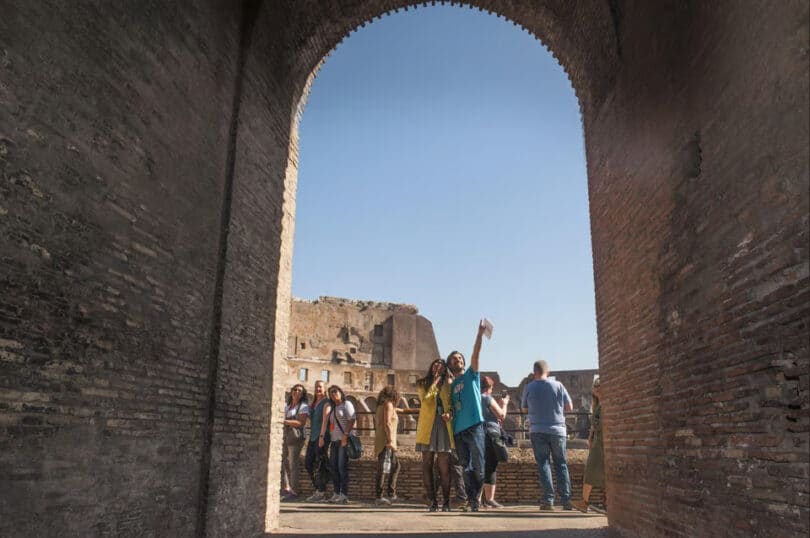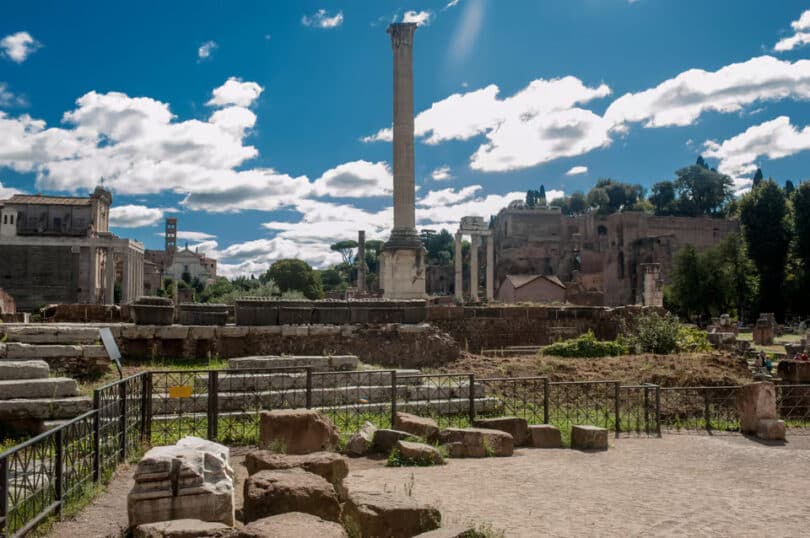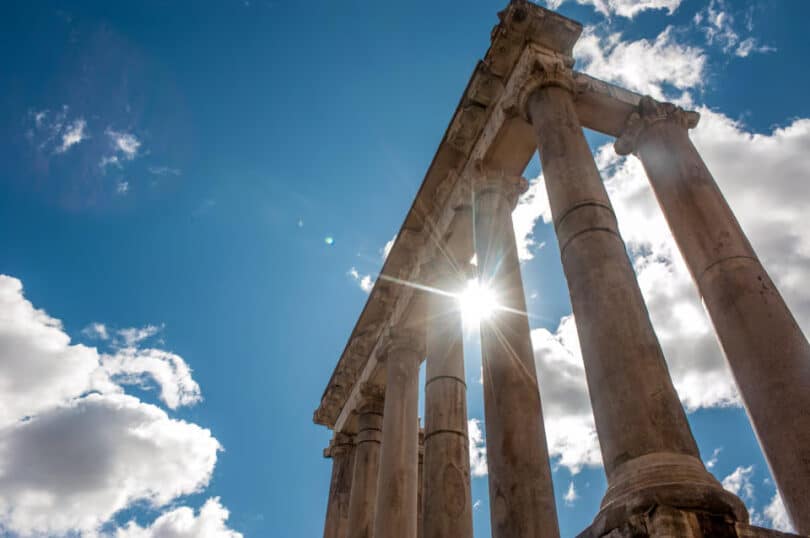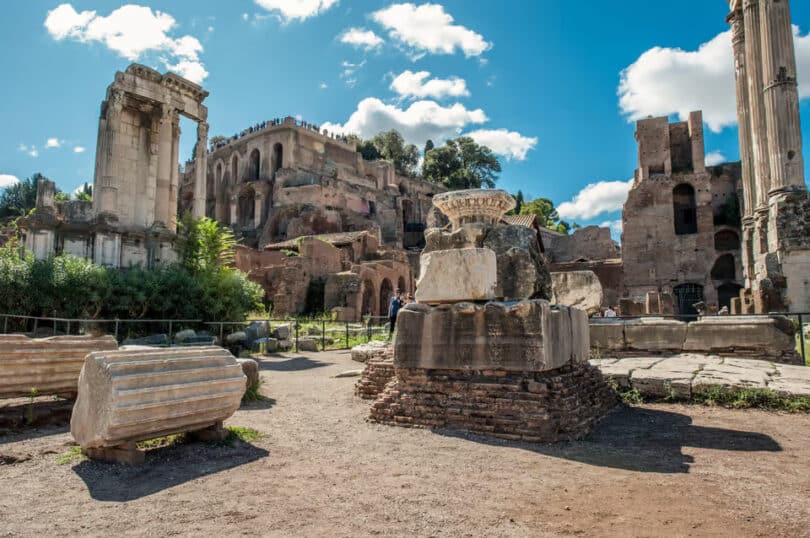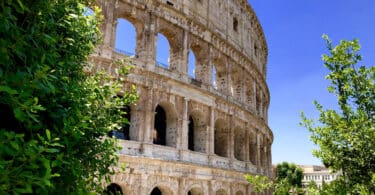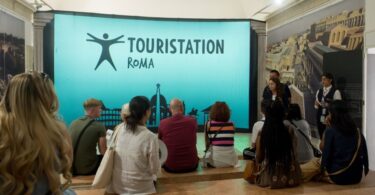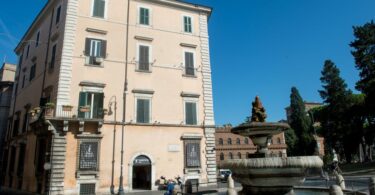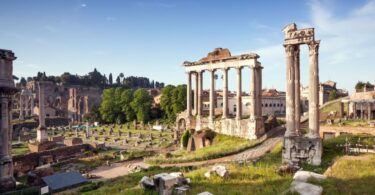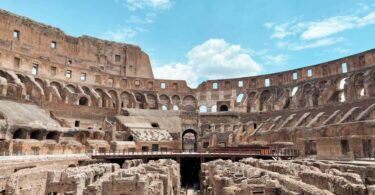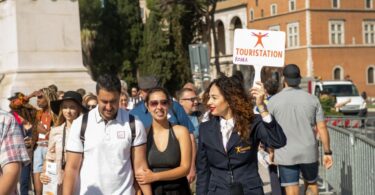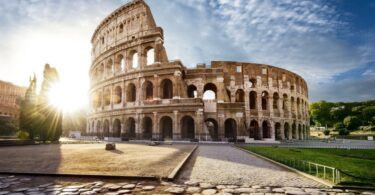24.957 Reviews
from €22.00 EUR
Organized by: Tours And Tours
Step into a realm where ancient myths intersect with recorded history, and immerse yourself in the splendor of Rome’s most iconic sites. This comprehensive ticket offers skip-the-line admission to the Colosseum, Roman Forum, and Palatine Hill, plus an audio guide that unravels the legends, engineering marvels, and cultural milestones behind each landmark. Whether you’re a history aficionado or simply curious about the city’s imperial past, this in-depth excursion reveals Rome’s layered heritage with every step. Both sites offer a fascinating glimpse into ancient Rome’s daily life and political landscape:
- Roman Forum: This bustling marketplace was the heart of ancient Rome, where citizens gathered to discuss politics, conduct business, and attend religious ceremonies.
- Palatine Hill: As one of Rome’s seven hills, Palatine Hill is steeped in myth and history. It is believed to be the birthplace of Rome and was home to emperors and aristocrats, offering stunning views of the city below.
Started under the Roman Emperor Vespasian in 72 AD, and finished by his follower Titus in 80 A.D., the Roman Colosseum was the biggest amphitheater ever before constructed.
Your ticket additionally consists of one entrance to Palatine Hill, a must-see view for all those visiting Rome. According to an old tradition, this is the area that is the birthplace of Eternal City. Overlook at the ancient ruins of Roman temples in the Imperial Forum, the center of all political, social, and also economic life in Rome throughout the Roman Republic.
Important information: The Colosseum can host a maximum of 3.000 people at the same time. This situation can cause the ticket stocks to end on the same day and for the next few days. If the day you want is not available; we recommend Colosseum Priority Entrance + Arena Floor Package or Priortiy Entrance Tickets for Mamertine Prison, Colosseum, Roman Forum and Palatine Hill or Last Minute Tickets.
Everyone recognizes the Colosseum with its three tiers of arcading. Strangely, it was not until the first century after Christ that Rome decided on the luxury of a permanent amphitheater for its infamous blood sports.
Completed under Titus, the arena is in the form of an ellipse measuring 190 by 155 m (620 by 513 ft) overall. Some 50,000 spectators could be accommodated to watch the gladiators and wild beast shows, protected from the rain or the scorching sun by the velum or velarium, a huge sailcloth awning stretched above the terraces.
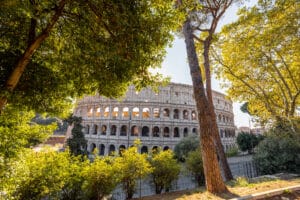
View of Roman Colosseum
The games were the constant talk of Rome; the inaugural performances lasted for 100 days and involved the slaughter of over 5,000 wild animals. The arena could also be flooded for the staging of mock naval combats. But was the Colosseum also the scene of Christian martyrdom? Nowadays the idea is viewed with some skepticism, though the Stations of the Cross set up around the arena perpetuates the belief. Whatever the truth, gladiator shows were held here till they were banned by Honorius (395-423) in 404. Transformed into a fortress in the Middle Ages, the building soon began to serve as a stone quarry. The Arch of Constantine is scarcely less famous than its world-renowned neighbor, it was raised in 315 to commemorate the victory of Constantine over his rival Maxentius.
How to Get to the Colosseum
The Colosseum is easily accessible by various modes of transportation:
- Metro: Take Line B and exit at the Colosseo station. The Colosseum is just a short walk from the station.
- Bus: Several bus lines stop near the Colosseum, including lines 75, 81, 673, 175, and 204.
- Tram: Tram line 3 stops at the Piazza del Colosseo, conveniently located near the entrance to the monument.
-
Walking: The Colosseum is within walking distance from many popular attractions, such as the Roman Forum, Palatine Hill, and Piazza Venezia.
Before You Go
- Have valid identification ready for all participants, including children, at the Colosseum entrance.
- Expect security checks at each site, which can cause a short wait despite fast-track entry.
- Ensure you enter accurate full names for all participants when booking; tickets without correct names are not valid.
- Bring a personal mobile phone and earphones to fully experience the audio guide app.
- The tour may begin at any of the three sites (Colosseum, Roman Forum, or Palatine Hill), depending on availability.
- Entry tickets are strictly timed, so please arrive promptly at your designated slot.
Roman Forum: Historical Background
We are in the centre of ancient Rome. Here, Rome built after having dried up the marshlands its Forum where all the political, religious and commercial activities were held, between the Palatine, the Capitol and the Esquiline hills. It is not easy to move about these ruins without having some knowledge of the ten centuries of history – from the 6th century BC to the Byzantine age – only then, the monuments become meaningful. From the archaic Lapis Niger (Black Stone) to the Column of Phocas – the last monument to be built in the Forum – dating from 607 AD placed in order to celebrate the Byzantine Emperor Phocas, when rome had lost its splendor The orators spoke from the Rostra to the romans who had to elect their authorities.
The Curia, the Senate-houses and the political centre of ancient Rome, seems to have been built for the first time by by TuJius Hostius. It was reconstructed in 52 BC. but a new one was inaugurated in 29 BC by Augustus. What we see today is the last reconstruction wanted by Diocletian in 303 AD. The Curia has a magnificent interior although the present wooden ceiling is modern. It was able to seat 300 senators. In the Curia the so-called Plutei of Trojan are exhibited. They are two marble sculptured balustrades that probably decorated the Rostra and emphasised the merits of the Emperor Trajan. They also show how the Forum was laid out at the time. If the Curia was the political centre of Rome, the Basilica was the place where justice was administrated. The typical basilica was a great rectangular room with arcades on its sides. The Basilica Emilia is the most ancient basilica and the only one of which we have remains.
It was founded in 179 BC by the censor Aemilius Lepidus. It looks onto the Via Sacra and was originally richly decorated, but during the Middle Age, it was ransacked by the barbarians. Thanks to archaeological excavations a marble frieze of great interest for the understanding of the origins of Rome was found here. The Basilica Giulia , built by Caesar, was also completely destroyed. The Maxentius Basilica has three aisles and is supported by massive walls instead of the usual colonnade. After the Curia and the Basilica the temple was the most important building of the Forum. The remains of the Temple of Vesta from the end of the 2nd century BC.are entirely in brick, as is the nearby House of the Vestals; the latter is a large rectangular atrium arranged around a spacious courtyard.
inside the round temple dedicated to Vesta was kept the sacred fire, symbol of the state, wich hadn’t to burn out. In the Forum, there are the remains of the Temple of the Dioscuri, the mythical brothers Castor and Pollux, winners of the battle against the Etruscans and Latins. The temple was built in 484 BC, and then reconstructed in 1 17 AD, but the only three remaining pillars belong to a subsequent reconstruction done at the time of Tiberius (14-37). The Temple of Saturn is amongst the most ancient in Rome and is found at the foot of the Capitoline Hills. Its use was to keep the Public Treasury of the city Further ahead, are the remains of a colonnade that was found a century ago, the so-called Portico of the Dei Consentes. Probably the temple was dedicated to the twelve great divinities of Olympus; inside were kept golden statues of the gods and therefore the building is considered to have been the Roman version of the Greek Pantheon.The Temple of Concord is also found in the Forum. It is an important monument built in 367 AD by Furius Camillus in order to celebrate the end of the struggles between the patricians and the plebeians; the podium has been restored many times. After Caesar was assassinated, his body was cremated in the Forum and a pillar was built in memory of him. In 29 BC a Temple was dedicated to Caesar by Augustus, the first example of the deification of an Emperor Today there are some remains of the podium and of the tribune in front of it.
The Temple of Antoninus and Faustina was dedicated, in 141 AD, by Antonius Pius to his wife, and, after her death, to her imperial memory. lt is one of the best preserved temples thanks to the fact that it was converted into a church (now the Church of San Lorenzo in Miranda). Placed on a high podium, it has a splendid fagade with marble columns and steps. The well preserved frieze decorated with griffins, branched candlesticks and volutes is lovely Unusual is the bronze door kept in the Temple of Romolus. It was built on the Via Sacra (Holy Road) by Maxentius to honour his son who died in 309. It has an innovative structure; a circular building flanked by two rectangular rooms with apses. In the 4th century. Pope Felix IV adapted it as an atrium of the Church of Saints Cosmas and Damian. After the ancient Roman Forum it is worth visiting the later Forums, built during the era of the Emperors and therefore called Imperial Forums.
Why This Experience Lasts in Your Memory
Embarking on this journey lets you forge a deeper bond with Rome’s monumental legacy. Each venue unveils a mosaic of stories—from the roar of the Colosseum’s spectators to the hum of trade and negotiation in the Forum, to the mythical foundations on Palatine Hill. Pause for a moment where gladiators once fought, and let your imagination run wild as you stand atop the very ground where Rome itself was said to be born. These layers of history converge to create an immersive experience that resonates well beyond your time in the Eternal City.
- Assistance at the designated meeting point
- Downloadable audio guide app (mobile device required)
- Fast-track access to the Colosseum’s ticket area
- Arena Floor entry (if this option has been selected)
- Admission to the Roman Forum
- Admission to Palatine Hill
- Entry ticket to the Colosseum
- Guided tour
- Transportation
- Pets, luggage, large bags, alcohol, drugs, sprays or aerosols, glass objects are not allowed
Free cancellation up to 1 day before your visit.
from €29.00 EUR
Seller: Tiqets
3.802 Reviews
from €29.00 EUR
Organized by: Tiqets
18.092 Reviews
from €36.00 EUR
Seller: Tiqets
96 Reviews
from €71.00 EUR
Duration: 3 Hours
Organized by: Show Me Italy
14.603 Reviews
from €260.00 EUR
Duration: 7 Hours
Seller: Musement
from €85.00 EUR
Duration: 3 Hours
Organized by: Rolling Rome Segway
25 Reviews
from €18.00 EUR
Closest Date: March 5
Validity: 24-hour
Seller: Parco archeologico del Colosseo
from €31.00 EUR
Duration: 3-4 Hours
Seller: Tiqets
3.328 Reviews
from €39.00 EUR
Validity: 2 Days
Organized by: Tiqets
1.029 Reviews
from €48.60 EUR
Duration: 3 Hours
Organized by: Gray Line I Love Rome


